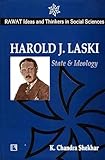Harold J Laski : State and ideology
Publication details: Jaipur Rawat Publications 1999Description: 278pISBN:- 9788170335016
- 320.092000 SHE
| Item type | Current library | Call number | Status | Date due | Barcode |
|---|---|---|---|---|---|
 BOOKs
BOOKs
|
National Law School | 320.092 SHE (Browse shelf(Opens below)) | Available | 16452 |
ABOUT THE BOOK
This book carefully examines the hypothesis that Professor Harold J. Laski attempted to establish a political system bereft of antagonism between the claims of individual freedom and social justice based on liberty and equality. Laski’s attempt to reconcile the rights of the individual with the social good is abundantly illustrated in the first half of the book. The later half deals with ideologies. Besides, several aspects of democracy, liberalism, socialism, communism, nazism and fascism are discussed. Laski was a liberal and gradually he moved on to socialism and communism, and finally he was a democratic socialist. The author has clearly pointed that Laskis approach is neither normative nor pragmatic, but eclectic. The need of the hour is a new social order based on liberty, equality and moral values. True development is possible when man sheds his ego and does something that is worthwhile for the state and then there remains no difference between moral action and social action. The book is unique in its approach, that is, analytical, descriptive, evaluative and synthetic. Both students and scholars will find this book of immense use and tremendous interest.

There are no comments on this title.